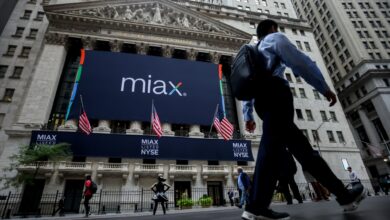These U.S. consumer stocks face higher China risks, TD Cowen survey finds

U.S. brands are rapidly losing their appeal in China as locals increasingly prefer competitive homegrown players, especially as economic growth slows, according to a TD Cowen survey released Thursday. While overall preference for Western brands dropped to 9%, down from 14% last year, certain American companies face higher risks than others, the report said, citing in-person interviews of 2,000 consumers with varied income levels in larger Chinese cities. TD Cowen partnered with an unnamed Beijing-based advisory firm to conduct the survey in February 2025, following a similar study in May 2024. The analysts see Apple ranking among the better-positioned brands in China. But they warned that several other American companies face high regional risks despite management optimism. China’s top leaders on Friday acknowledged the growing effect of trade tensions, and pledged targeted measures for struggling businesses. The official readout stopped short of a full-on stimulus announcement. “This year’s survey was conducted before the US-China trade war intensified, though threats were on the horizon,” the TD Cowen analysts said. “Add this factor to the equation, and it’s easy to see why uncertainty will remain elevated and households are likely to remain cautious going forward.” The survey found income expectations declined, with the share of respondents expecting a decline in pay over the next 12 months rising to 10% from 6%. In particular, Chinese consumers plan to spend less on a beauty items over the next six months, the survey showed, while increasing their preference for Chinese brands. U.S. cosmetics giant Estée Lauder retained first place in terms of highest awareness among Western beauty brands in China, but preference among consumers dropped to 19.6% of respondents, down from 24.3% last year. That contrasted with increases in respondents expressing a preference for the second and third market players Lancome and Chanel, respectively. In the quarter that ended Dec. 31, Estée Lauder said its Asia Pacific net sales fell 11%, due partly to “subdued consumer sentiment in mainland China, Korea and Hong Kong.” Asia Pacific accounted for 32% of overall sales in the quarter. In the lucrative sportswear category, Nike “lost meaningful preference in every category” versus last year, while local competitors Li-Ning and Anta saw gains, the survey found. TD Cowen’s analysis showed that among U.S. sportswear brands facing the most earnings risk relative to consensus expectations, Nike has the highest China sales exposure at 15%. “The China market is one characterized as a growth opportunity for sport according to Nike management in its recent fiscal Q3:25 earnings call in March 2025,” the analysts said, “but that the macro offers an increasingly challenging operating environment.” It’s not necessarily about slower growth or nationalism. While the survey found a 4-percentage-point drop in preference for foreign apparel and footwear brands, it also showed a 3-percentage-point increase in the inclination to buy the “best” product regardless of origin. “The implied perception here is that Western brands are offering less in the way of best product or value,” the TD Cowen analysts said. Starbucks similarly is running into fierce local competition while trying to maintain prices one-third or more above that of competitor Luckin Coffee, the report said. The survey found that the U.S. coffee giant “lags peers in terms of value and quality perception improvement.” Other coffee brands such as Manner, Tim’s, Cotti, %Arabica and M Stand have also expanded recently in China. Starbucks’ same-store sales in China fell 6% year on year in the quarter that ended Dec. 29, bringing the region’s share of total revenue to just under 8%. More worrisome is that a highly anticipated coffee boom in China may not materialize. “We note daily and weekly frequency of purchase among coffee drinkers are decreasing, suggesting the coffee habit seen in the U.S. is not taking hold in China,” the analysts said. They noted a new ownership structure for Starbucks‘ China business would be positive for the stock given the lack of near-term catalysts. TD Cowen rates Starbucks a buy, but has hold ratings on Nike and Estée Lauder.




